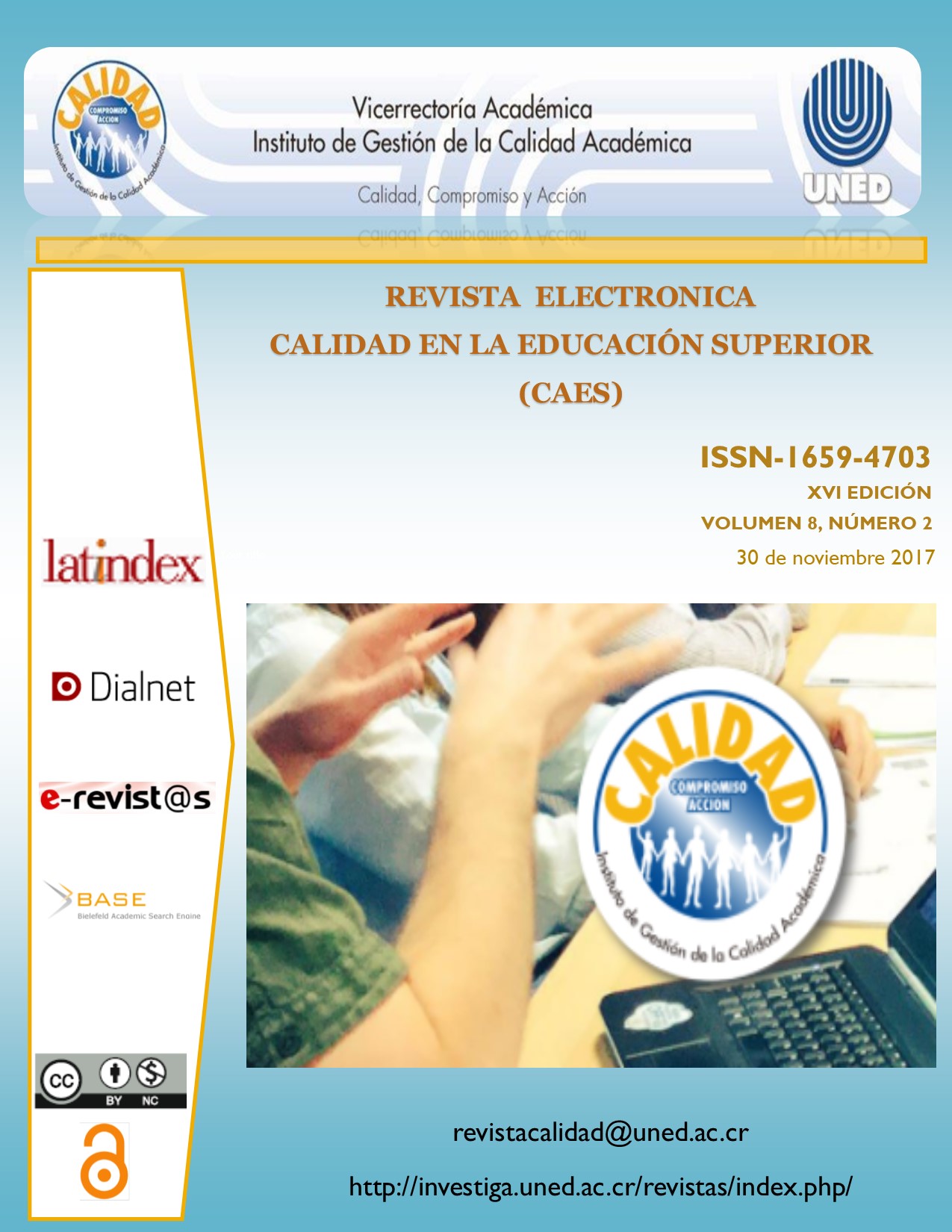EVALUATION OF BASIC KNOWLEDGE IN CHEMISTRY DIVERSIFIED EDUCATION STUDENTS: THE CASE OF INDUSTRIAL ENGINEERING, UNED
DOI:
https://doi.org/10.22458/caes.v8i2.1915Abstract
One of the great challenges that the Ministry of Public Education (MEP) has in Costa Rica is to improve the quality of teaching chemistry at the secondary level and reduce the gap between scientific and academic schools. The Universidad Estatal a Distancia (UNED), as a higher education institution worried about this problem created a diagnostic-level plan in chemistry to establish basic knowledge of this subject for students entering the Industrial Engineering career, this plan consisted of Two stages: The first stage was carried out between 2013 and 2014 where a diagnostic test was carried out, which was applied to scientific and academic colleges that attended the diversified cycle and to students who wanted to enter the industrial engineering career. The second stage was to create a leveler course in chemistry, in order for first-year students to acquire basic knowledge to undertake university courses in General Chemistry I, which has been taught since 2014 to date by the UNED. This paper presents the experience of the Chair of Chemical Sciences in the design and implementation of the diagnostic test and the first results obtained from the leveling chemistry course as a strategy to improve the academic performance of students entering the UNED.
References
Colegio Científico Costarricense de San Pedro. (2014). Admisión. Recuperado de http://colegiocientificosanpedro.ed.cr/node/2
Ley de Promoción del Desarrollo Científico y Tecnológico de 1990. La Gaceta 7169.
Ley Fundamental de Educación de 1957. La Gaceta § 2160.
Madrigal, A., Syedd, R., Montero, E., & Vega, J. (2010). Análisis de las Olimpiadas Nacionales de Química en Costa Rica: Alcances y retos para la población joven. UNICIENCIA, 26 (1), 29-40.
Marín, M. G. (2010) Antología de calidad (2da ed.), San José, Costa Rica: Ministerio de Educación Pública.
Mata, S. (2011). Colegios Científicos de Costa Rica se convierten en ascensores para movilidad social del país. Informa TEC, 315. Recuperado de
http://www.tec.cr/prensa/informatec/2011/agosto/n8.html
Programa de química para bachillerato (s.f.), San José, Costa Rica: Ministerio de Educación Pública.
Ramírez, J. L. (2006). Las tecnologías de la información y de la comunicación en la educación en cuatro países latinoamericanos. Revista Mexicana de Investigación Educativa, 11 (28), 61-90
Roldán, L. (2012, 26 de octubre). Razones del éxito de los colegios científicos, La Nación. Recuperado de http://www.nacion.com/opinion/foros/Razones-exito-colegios-cientificos_0_1301469884.html
Sol, R. (2004). Diagnóstico sobre la Formación de Docentes en Instituciones de Educación Superior en Costa Rica. San José, Costa Rica: Autor.
Tedesco, J. C., Lopez, N. (2002) Desafíos a la educación secundaria en América Latina. Revista de la CEPAL, 76, 55-69.
Downloads
Published
How to Cite
Issue
Section
License
Esta revista provee acceso libre inmediato a su contenido bajo el principio de que hacer disponible gratuitamente la investigación al publico, lo cual fomenta un mayor intercambio de conocimiento global.
